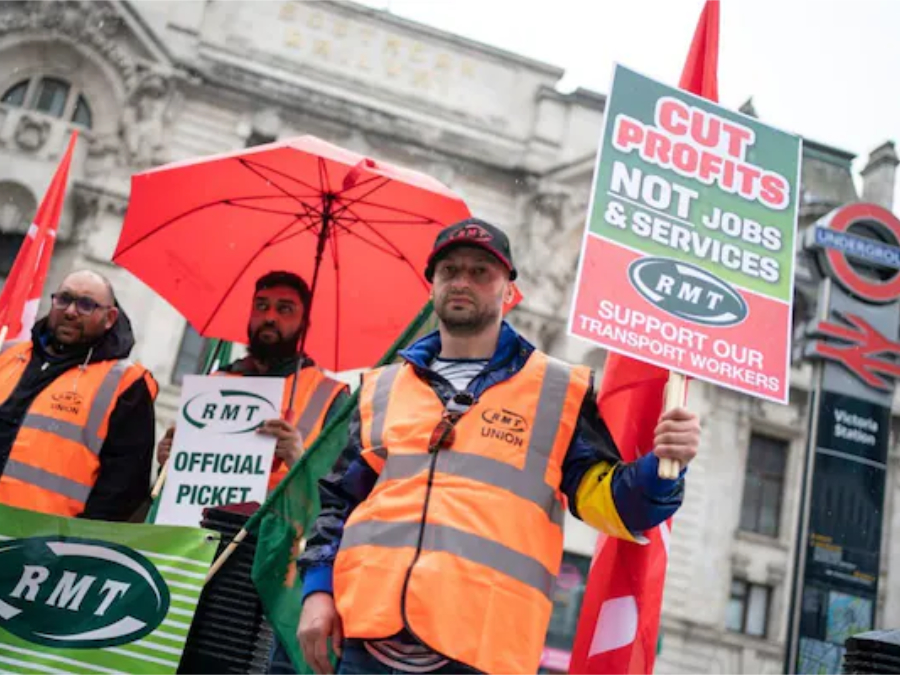
Lambeth: Colonialism, Power and Pawns
July 27, 2022
Martyn Percy: Lambeth Conferences and Calls – A Lessons Learned Review
July 29, 2022It looks like we are in for a few months of strikes. As more and more people are being financially squeezed, resistance is increasing. The media, almost universally, are treating them as demands for more money by the relatively affluent. There is a grain of truth in this, because the ability to go on strike is beyond the very poorest. Meanwhile we are also being shown that the next prime minister, whoever it will be, is too rich to have the slightest understanding of the pressures facing the impoverished.
What did Jesus think about poverty? If we could establish beyond doubt what he thought about anything at all, it would by dynamite. Millions of believers might be proved wrong! Most churches offer their preferred account of what he was like quite independently of scholarly research on him. But if we think Jesus matters, the research is our best way of finding out.
Avoiding the obstacles
There are well-established obstacles to avoid.
Divinity. In theory mainstream Christian doctrine has been that Jesus was fully human as well as being fully divine. In practice the human element is pretty effectively suppressed. This is upside-down: nobody would ever have called him divine if it wasn’t for the outrageously controversial – and challenging – things the human Jesus said and did.
Politics. Since the eighteenth century it has been a popular theory that religion and politics must be kept separate. So Jesus won’t have had a view about poverty. This is a typically modern type of compartmentalisation: religion in this box, politics in that box. In Jesus’ day nobody thought like that. Jesus was fully engaged in the issues of first century Galilean poverty.
The poor you have always with you. This statement by Jesus (Matthew 26:11) is often misquoted to imply that Jesus thought poverty inevitable – so today the churchgoing affluent can shrug their shoulders and accept that other people always will be poor. The people who heard Jesus say it it would have understood it quite differently. They would have recognised it it as a reference to Deuteronomy 15:4-5. This text states that there would be
no one in need among you, because the Lord is sure to bless you… if only you will obey the Lord your God by diligently observing this entire commandment that I command you today.
In context the point was that poverty was caused by disobedience to God’s laws.
Poverty in first century Galilee
A number of scholars (I have been reading Richard Horsley, Bruce Longenecker and Douglas Oakman) have depicted first century Galilee as a site of widespread destitution. Their evidence comes from the literature of the period and social scientific studies. The main literary sources are the Gospels and Josephus, though there are others. Josephus describes a series of protests, rebellions and prophetic movements, all implying extreme deprivation. This is in keeping with anthropological and sociological studies of how ancient agricultural empires worked. About 10% of the Roman empire’s population would have been absolutely destitute. In Galilee the figure is likely to have been higher.
Some scholars disagree. Anthony Keddie’s Class and Power in Roman Palestine argues that archaeological findings give a very different picture. They reveal an increase in possessions, most significantly expensive possessions imported from a long way away. The archaeological evidence points to increasing trade, and therefore economic growth. Keddie argues that the trend was towards Palestinians being better off.
How did Jesus respond?
This makes a difference to the kind of agenda we can attribute to Jesus. Horsley locates the early Jesus movement in villages where starvation and destitution were increasing. Typically, when a society’s quality of life degenerates, anger increases and sufferers blame each other. We have seen this lately with immigrants and the unemployed blamed for deteriorating standards which are actually caused by government decisions. Jesus encouraged villagers to put aside their quarrels, cancel all debts, make sure everybody gets something to eat and let tomorrow take care of itself.
On the other hand, if the standard of living was stable or improving, it becomes harder to explain such a successful new movement beginning just then. Written texts may have been produced by people who were biased or mistaken; it’s harder to argue with archaeological evidence.
A reconciliation?
It seems to me that a reconciliation of these views is possible. Modern researchers of the ancient world are inevitably influenced by the values of their own society. Neo-liberal capitalism, being popular with Western governments, reveals what those governments want to proclaim and hides what they want to hide. They speak the language of economic growth and decline as though everybody was affected in a similar way. When the rich get richer they appeal to the fantasy of the ‘trickle-down effect’ (Adam Smith’s ‘invisible hand of Providence’) to presume that the poor will be getting richer too.
In fact this very rarely happens. The ‘trickle-up effect’ is much more common. People with power do what they can to improve their living conditions, rarely noticing whether others are adversely affected.
For a little over 40 years, throughout the capitalist West, there has been a trend for the rich to get richer. Have the poor got poorer? Governments control the collection and publication of statistics, so it is hard to establish without doubt that this has been happening. During this time new technologies have altered lifestyles, which makes comparisons harder. But here in Britain my generation of baby-boomers are well aware that our children and grandchildren are living in a harsher environment than we had: more pressure for jobs and money, longer hours at work, less protection for illness and unemployment. Numbers of homeless and starving have been continually rising, regardless of specific challenges like Brexit and Covid.
If we apply this to first century Galilee, the archaeological evidence no longer contradicts the literary and social-scientific evidence. The rich were getting richer and the poor were getting poorer. Farmers who couldn’t afford to pay their taxes were selling their farms. Wealthy people were buying up the farms. They could then employ the farmers to work the land. From then on the farmers would have to pay rent on top of their other expenditure. The more this happened, the more luxuries the landowners could afford and at the same time the more the farm workers were driven into ever deeper poverty.
Jesus and poverty
In keeping with the Jesus scholars mentioned above, I take it that Jesus argued for a revival of the Old Testament’s laws protecting the poor. Normal practice in those days was, in the language of modern economics, ‘liberal’: that is, it didn’t stop the rich getting richer at the expense of the poor. It was normal for people to starve to death. Those Old Testament laws set limits, to protect the poor and cancel debts. In Jesus’ day it was becoming harder to uphold them.
Jesus, of course, couldn’t legislate. What he could do was to challenge the Jewish establishment at the temple in Jerusalem. In reality they were governing as stooges of the Romans. Jesus could point out the contrast between the temple establishment and the Jewish laws they were supposed to be upholding.
We know how that ended. We dislike being criticised. We dislike it all the more when we know, deep down inside us, that our critics are right.
I don’t know how Jesus would have felt about the strategies and tactics of present-day strikers and their opponents. Who could? But given how he felt about poverty in first-century Galilee, and who he challenged about it, I think we can guess who would have had his sympathy.




